| Reviews & Columns |
|
Reviews DVD TV on DVD Blu-ray 4K UHD International DVDs In Theaters Reviews by Studio Video Games Features Collector Series DVDs Easter Egg Database Interviews DVD Talk Radio Feature Articles Columns Anime Talk DVD Savant Horror DVDs The M.O.D. Squad Art House HD Talk Silent DVD
|
DVD Talk Forum |
|
|
| Resources |
|
DVD Price Search Customer Service #'s RCE Info Links |
|
Columns
|
|
|
Undertow (2009)
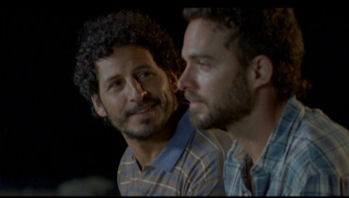
The Movie
Asking an audience to sympathize with a cheating husband can be an extremely risky proposition, especially if the unknowing wife is so unaware and so likable. Did I mention the wife was also about to give birth to their first child? Yep, it's a fine mess we've walked into here. But it's a huge credit to writer/director Javier Fuentes-León--and to his outstanding cast--that everyone in his feature debut comes across as genuine and sincere, making it difficult to shun the lead character despite his less than admirable behavior. This is an intense film filled with emotional complexity, a thought-provoking work that clearly comes from the heart.
With Undertow (Contracorriente), Fuentes-León wastes no time propelling us into the drama--we're made aware of the affair quickly, the director thankfully choosing to forgo any unnecessary set-ups that would simply waste time. It's a daring move, one that proves he isn't afraid to dive right in and tackle what's truly meaningful. In a small Peruvian seaside village, fisherman Miguel (Cristian Mercado) seems to have the perfect life: he's well-liked by the community, his work with the local church cementing his reputation as an upstanding man (one of the reasons he is selected by his peers to lead the funeral for his recently deceased uncle, the village entrusting Miguel to properly lay his soul to rest); and his pregnant and beautiful wife Mariela (Tatiana Astengo) is about to pop out young Miguelito (or Miguelita).
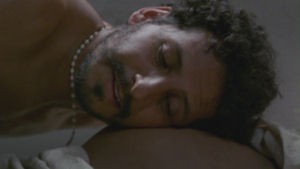
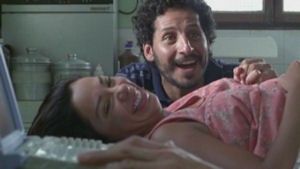
But unbeknownst to her, Miguel has an ulterior motive for all of his trips to sea to fix the nets underwater; he uses the excursions to have clandestine meetings with another man: Santiago (Manolo Cardona), a painter and photographer who has been ostracized by much of the village because of his sexuality ("I'm not one to judge, but you know about him. He's a bad example for the kids!" complains the town gossip. "I hope he goes back to where he came from...") . Santiago is another kind soul, and we know that he harbors guilt over the affair, an admission he makes to his sister. Frequently bearing the brunt of the locals' intolerance and anger--Miguel's cousin Hector (José Chacaltana) won't even accept a free beer from Santiago--he lives a life of solitude as he crafts his work of art at home. The only thing keeping him there is Miguel, who continually claims "I'm not like that!" when asked to own up to his true sexuality just moments after one of their many encounters.


Fuentes-León doesn't give us much by way of history between the two, or with Miguel's past in regards to his feelings for men; but that doesn't (and shouldn't) matter. It's another refreshing choice the director makes in focusing on the here and now--a lesson we can all learn from. How the heck is this mess going to be worked out? There can't possibly be a happy resolution in store, can there? Undertow is beautifully unpredictable, refusing to box itself into the conventions of so many of its peers. There are many scenes in the film that felt like "final scenes", but it has greater ambition and keeps you questioning where it will go. I've only shared the set-up of the story; it would be unfair to ruin the path the film follows for the bulk of its running time. I didn't see it coming, and it opens up a whole new world of themes, prompting reflection on a large number of questions that can have various meaning to viewers-- acceptance, friendship, responsibility, being true to yourself, what it means to be a man, adhering to your faith being a few of them. Like the sea that the film unfolds by, it is a deep and powerful work.
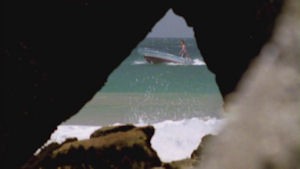
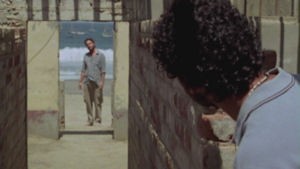
And the setting is another of the film's strengths, as essential t the story as the characters. Fuentes-León and cinematographer Mauricio Vidal have crafted a visually and aurally arresting work; the film is given added life by its remarkable surroundings, which inject a sense of serenity and peace amid all of the turmoil. The film is often a quiet one, with many nature interludes taking us into (or under) the water or onto the beach, where the sand dances across the earth and the sound of waves and seagulls fill the air. It prompts contemplation for more than just the characters. The story holds numerous parallels with nature and its forces, and these moments--where the majesty of the surroundings serve as an escape--force us to think. The director and DP also show a great sense of scene composition, many of the shots taking advantage of lines and architecture to artistically frame the characters and give an even greater sense of poetry to the proceedings.
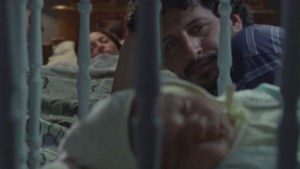

And all of the characters--not just the leads--serve a purpose. No one here can be written off on first impressions, and the director is able to give moments to all of them. Even if it's just a quick shot that captures a facial expression, we see that there's more to these people than initially meets the eye. That includes Isaura (Cindy Díaz), who we peg as a troublemaker. And even the brief scenes we get with Miguel's aunt and mother-in-law are memorable. But the film belongs to the three main characters, and all of them do a remarkable job. Cardona refuses to allow Santiago to be seen as "the other man", forcing us to see things from his perspective. He also gets a memorable scene in a market with an unknowing Mariela, one that is far more complex than you might think. Much like Michelle Williams in Brokeback Mountain, Astengo has perhaps the most difficult role here, one that could easy prompt pity--it doesn't, and thankfully we're never asked to dismiss or forget her feelings.

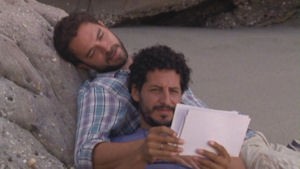
But this is Mercado's movie, and what a revelation he is. I haven't encountered a film character recently that I have "felt" as much as I do Miguel, and a huge part of that goes to the actor's immensely expressive face. What a complex and confused character he is given, a man struggling with his sexuality and his faith. Mercado wears the skin like it's his own--he is Miguel, and is able to make us understand the character's motives and reasoning even when it's selfish or ugly. The actor has one of the most endearing smiles you'll ever encounter, and he engages you from the very beginning as he proves masculinity and vulnerability are not mutually exclusive. He has an energy and presence that's undeniable, making Miguel likable and relatable even though some seemingly unforgivable sins. He's simply human--and Mercado tackles it with abandon, making us feel every ounce of ache that courses through Miguel's body. His scenes with Cardona are magnetic, the two actors sharing a connection that's so natural and organic you'd swear it was real. That's as much as you can hope for from actors, and I can only hope that all viewers are blind to their genders. What we see here is love, and the duo commits so well that you'll forget any labels.
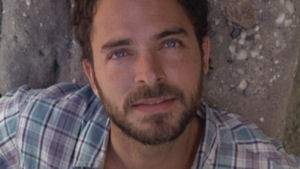

What a beautiful film. Filled with hope and tragedy, it's an emotional ride that forces you to ponder some serious issues. I need to reiterate that I've only scratched the surface on the story and its themes; to share too much would be spoiling it. Undertow travels to places you might not expect, touching upon so many truths with compassion, heart and at times even humor (which it handles as deftly as the dramatic touches). It's a rich work, one that builds so beautifully that by the time the unforgettable ending arrives, you'll be hard-pressed to maintain a dry eye--an outcome that is earned honestly, not easily or cheaply. The film leaves you aching for more, asking "What now?" It's a question with many possibilities, but the answer will most likely remain a haunting mystery.
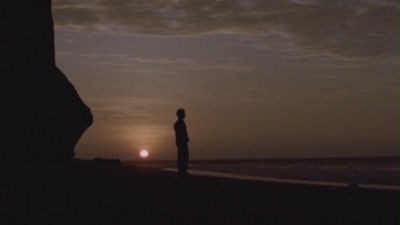
The DVD
Video:
The 1.85:1 anamorphic transfer is only average, although I'm guessing it represents what this small film looked like in theaters. While the cinematography is gorgeous and filled with some stunning location shots, the overall picture is pretty dull and lacks sharpness; even the subtitles look a tad hazy at times. Still, it doesn't detract from the wonderfulness of the film and doesn't hinder my high recommendation for the disc.
Audio:
The Spanish track is available in 5.1 and 2.0 options, with forced English subtitles. A modest yet effective effort, the 5.1 track immerses us nicely in the water and beach, with solid dialogue throughout.

Extras:
A great set of bonus features will make you appreciate the film even more. Undertow: A Look Inside (17:42) is an interview with writer/director Javier Fuentes-León (in English). "It's about being faithful to who you really are. Regardless of the sexual orientation in the movie, you're seeing a main character struggling with being authentic and being faithful to who he really is," he says, noting that the film started as a film school assignment to come up with a single scene showing conflict between three characters. The third part of the love triangle was initially a female, but Fuentes-León changed it after coming out of the closet. "I thought not only it would made it a more personal movie, and it would allow me to talk about my own process of coming to terms with who I really am...but also it would make the movie a much better drama."

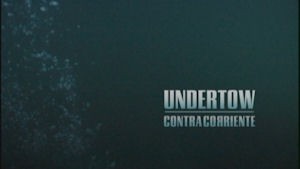
He talks about casting, nothing that Bolivian Cristian Mercado fully committed himself both physically and emotionally, while Manolo Cardona ("Colombia's version of Brad Pitt") took a risk with the role. The director also talks about how important it was for him to make both of Miguel's love interests likable, thus ensuring the driving dilemma was more human and complex. The director also shares his favorite scene and how it relates to his own personal experience. It's a wonderful interview that feels very personal, and shows you how much he cared about the film.
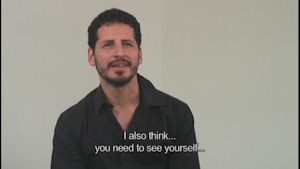

Next up is an interview with Cristian Mercado (5:24, in Spanish, subtitled) presented in a Q&A format. The actor's charisma comes through here as he talks about his love of the story and the character--and how he took risks to see where it would lead. "It was a gift for any actor...I saw myself in Miguel from the very beginning." He also shares his joy at seeing how the film has affected viewers. The interview with Tatiana Astengo (5:24, in Spanish, subtitled) follows the same format and is equally engaging. She talks about how the character forced her to find new levels of compassion and understanding, and you really sense her commitment to the role. She notes the cast didn't discuss the themes: "Otherwise it would become too intellectual. When you over-intellectualize things, at least in my case, you limit yourself...you might end up playing a stereotype. We didn't talk about it...we just let things flow." She ends by sharing how fascinating it is to hear about other viewers' interpretations, which continue to shape and change her impression of Mariela.

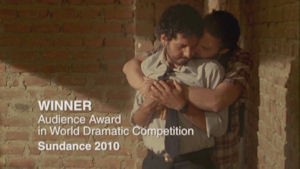
The behind the scenes featurette (10:50, in Spanish, subtitled) has footage from the shoot and features another interview with Fuentes-León (there is slight repetition from the first feature, but plenty of new observations and insights). The director talks about the lure of Cabo Blanco (where the film was shot), while director of photography Mauricio Vidal notes that the village was overflowing with natural elements like texture, colors, dust and wind that were essential to the story. Adds the director: "The sensation of being boxed in, experienced by the main character...I want the audience to feel, as the main character does, that this is all there is to the world." He later adds that he was always afraid of shooting (he far prefers writing and editing), but the experience was a joyous one with a feeling of family amongst the cast and crew. The three primary cast members also chine in briefly, including the only appearance in the extras by Cardona.
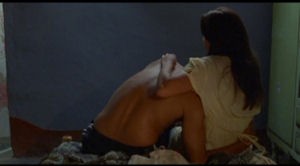

Up next is a collection of 21 deleted/extended scenes (23:15, non-anamorphic). There are some interesting moments here and some curious omissions that all expand upon some of the film's central themes; some were wisely left out, but others could have easily been included (all are worth the watch). Most intriguing is the last deleted scene, which puts a different spin on one character. My favorites were the eighth scene (where Miguel makes a plea to a family member) and the 12th (a nice moment between Miguel and Santiago), while the 15th presents an interesting question.
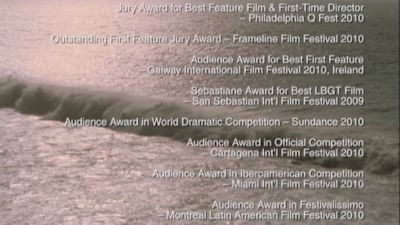
The film's trailer, a GLAAD PSA (featuring Sofia Vergara, in Spanish bud oddly without subtitles) and trailers for other Wolfe features round it out.
Final Thoughts:
I hate to force any comparisons, but you might recall the tagline on the Brokeback Mountain poster: Love is a force of nature. It's an observation that fits perfectly with this marvelous Peruvian feature, a complex, compassionate work about a man torn between two worlds as he is forced to question who he is. Filled with rich characters and honest emotion--including an intense ache that actor Cristian Mercado embodies--it is overflowing with relatable themes that force us to ponder what it means to be true to yourself. Undertow is further brought to life through the unforgettable sights and sounds of its location and through some artistic ambitions behind the lens. It all combines to form an even more contemplative and poetic story that culminates with a moving conclusion. An honest, beautiful work from start to finish, it's a refreshingly unpredictable effort filled with marvelous performances and a passion that is impossible to ignore. Highly Recommended.
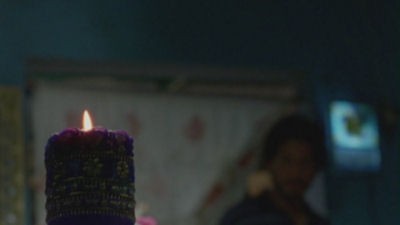
|
| Popular Reviews |
| Sponsored Links |
|
|
| Sponsored Links |
|
|
| Release List | Reviews | Shop | Newsletter | Forum | DVD Giveaways | Blu-Ray | Advertise |
|
Copyright 2024 DVDTalk.com All Rights Reserved. Legal Info, Privacy Policy, Terms of Use,
Manage Preferences,
Your Privacy Choices | |||||||














